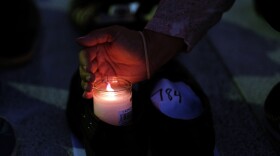
Adrian Florido
Adrian Florido is a national correspondent for NPR covering race and identity in America.
He was previously a reporter for NPR's Code Switch team.
His beat takes him around the country to report on major flashpoints over race and racism, but also on the quieter nuances and complexities of how race is lived and experienced in the United States.
In 2018 he was based in San Juan, Puerto Rico, reporting on the aftermath of Hurricane Maria while on a yearlong special assignment for NPR's National Desk.
Before joining NPR in 2015, he was a reporter at NPR member station KPCC in Los Angeles, covering public health. Before that, he was the U.S.-Mexico border reporter at KPBS in San Diego. He began his career as a staff writer at the Voice of San Diego.
Adrian is a Southern California native. He was news editor of the Chicago Maroon, the student paper at the University of Chicago, where he studied history. He's also an organizer of the Fandango Fronterizo, an annual event during which musicians gather on both sides of the U.S.-Mexico border and play together through the fence that separates the two countries.
-
Island officials will have discretion to spend the federal money as they see fit. But some worry the government's plans will leave local communities behind.
-
The damage to 1,800 tombs in the Lares Municipal Cemetery was so extensive — and so horrifying — that health officials locked the cemetery gates after Hurricane Maria. They haven't been reopened.
-
Puerto Rico's governor pledged to run a transparent recovery process. But as billions of dollars are on the way, many say there are indications that transparency may not be a top priority.
-
Puerto Rico's governor updated the island's official death toll from 64 on Tuesday after the long-awaited study, based on access to government mortality data and death certificates, was released.
-
Hundreds of pairs of shoes were laid out on the marble plaza in front of Puerto Rico's capitol building on Friday, representing hurricane dead who protesters say the government must officially tally.
-
Seven months after Hurricane Maria, thousands of people in the Puerto Rican mountains are still waiting for the lights to come back on. Why is power restoration for the last 2 percent so difficult?
-
Hundreds of thousands of U.S.-born children have had a parent detained or deported by immigration authorities. One family provides a glimpse into the mental health challenges these kids may face as a consequence.
-
Data suggest gay Latinos are less likely to take the drug despite high risk for HIV. Advocates point to one big reason.






